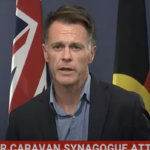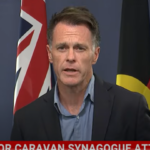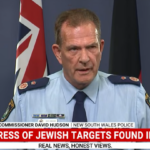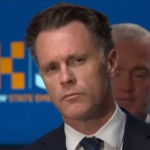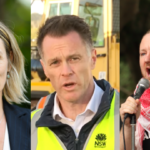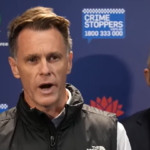Failure of Senior Labor Staffers to Attend Dural Caravan Inquiry Speaks Volumes
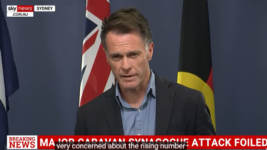
The members of a New South Wales upper house inquiry into how much premier Chris Minns and the state police minister knew regarding police suspicions that an explosive-laden caravan located on a Dural property was a “setup” were stunned on Friday 20 June 2025, when the five senior staffers belonging to the ministers under the microscope failed to turn up to testify on this matter.
Inquiry chair Independent MLC Rod Roberts and seven other members weren’t completely barrelled over, mind you, as MLCs can’t require lower house members to appear before an inquiry, so the premier and police minister Yasmin Catley had refused to appear, while the staffers had turned down an earlier mid-May request, and on 19 June 2025 they’d emailed Roberts to say they would not be there.
But there was a clear difference in approach taken by Roberts when requesting the five staffers show up this time, as he’d summonsed them under the terms of the Parliamentary Evidence Act 1901 (NSW), which permits the authorities to take those who do not show up after being issued with a summons into custody and to hold them until they do appear and answer the questions put to them.
The issue underlying this scenario is the caravan was located during a monthslong “antisemitic” crimewave, and its discovery led NSW Labor to pass three bills containing extreme hate crime and antiprotest laws, however senior NSW police considered the 19 January located caravan was a staged incident within days of discovering it and had also told the premier this “very early on”.
And the members of the Select Committee on the Relationship between the Dural Caravan Incident and the Passage of Relevant Bills through the Legislative Council inquiry announced following the no-show that they’d be asking the president of the NSW Legislative Council “to seek warrants from the Supreme Court to secure the attendance” of the five senior staffers.
Too busy to oblige
‘This decision follows numerous attempts by the committee over several weeks to secure the attendance of these staff by invitation and ultimately by summons,” said Roberts in a 20 June statement explaining that the inquiry members had come to the decision to take the significant step of applying for warrants.
“It was only after its invitations to the premier, attorney general and minister for police and counter-terrorism to appear before the committee were rejected that we then proceeded to invite ministerial staff,” the independent upper house member continued.
Minns told 2GB Radio last week that he considered the inquiry “a giant conspiracy”. Prior to the 22 May hearing, he wrote to lower house speaker, Greg Piper, outlining he believes the inquiry terms of reference threaten comity, or harmony, between the two houses of parliament and added that he’d be calling on the Standing Committee on Parliamentary Privilege and Ethics to consider these terms.
In speaking with 2GB shock jock Ben Fordham on 17 May, the NSW premier said he had refused to attend the inquiry because he already has to answer questions in parliament every day it sits, as well as at budget estimates hearings twice a year, and he’s really too busy to turn up for extra inquiries. He added that he had also told his staffers not to turn up last Friday despite being summonsed.
Prior to adjourning last Friday’s hearing, Roberts explained to the empty chamber that the upper house is the “house of review”, so it’s simply its job and not a conspiracy and despite such assertions it’s not seeking to punish staffers either, and there is a well-established body of precedence of ministerial staff appearing before committees… either voluntarily or, if necessary, under summons.”
“A mass casualty event”
From late October 2024 through to early February there was a spate of arson and graffiti attacks mainly perpetrated on Gadigal land around inner city Sydney and its eastern suburbs. The crimes were accompanied at first by anti-Israel messaging due to the Gaza genocide, but after some time the messaging changed to antisemitic statements, which ensured they were considered hate crimes.
Unbeknownst to the public, NSW police located a caravan on Dharug land in the semirural suburb of Dural on 19 January with decades-old explosives in it, but no detonator and a note listing Jewish properties on Dharug land, which linked into the citywide “antisemitic” hate crime scare. And this was kept a secret during investigations until someone leaked its existence to the press on 29 January.
NSW deputy commissioner Dave Hudson expressed doubts about the caravan, during a 29 January joint presser with premier Minns. The senior officer suggested the incident might be a staged setup, and he delved into these doubts more so on the ABC the following day.
At the same 29 January press conference, Minns said “there was a mass casualty event”, as well as stating “there’s only one way of calling it out and that is terrorism”, and he added he’d been receiving regular briefings about the incident.
The Minns government then produced a hate crime bill and an antiprotest bill on 11 February, while a last-minute inciting hatred bill appeared on 18 February. These contain extreme, rights-eroding laws that the NSW attorney general explained were predicated upon “recent instances of antisemitic behaviour”, and the most prominent instance in the public mind at this point was the Dural caravan.
On 10 March, however, the Australian federal police and the NSW police held a joint press conference explaining that the Dural caravan was staged, as were all of the serious so-called antisemitic incidents making up the crimewave.
The setup was undertaken by organised crime figures, who were facing prison and wanted a bargaining chip to lessen the harshness of the punishment they would face if they tipped off police about potential crimes, like that of a caravan full of old outdated explosives.
Focusing on the politically advantageous line
Straight after the announcement about the antisemitic crimewave being a “fabricated terror plot”, questions began circulating about how much the NSW premier and the police minister knew about the doubts of police, especially as Hudson had been suggesting the Dural caravan incident might be a setup since news of the explosives was leaked on 29 January.
The first day of the inquiry was 7 April. It involved three senior NSW police including Hudson, who told the inquiry that he was suspicious the caravan might have been “a manipulation of the justice system” from “quite early on”. And he added, “At my briefings, which were limited, with the premier, I expressed my suspicion over the motivation behind it from very early on,”
Hudson could also recall briefing minister Catley on 21 January, just two days after the caravan was located. He could remember that Minns was not present, but he considered he’d already briefed the premier on the matter by that stage, which was eight days before Minns told the NSW public “there’s only one way of calling it out and that is terrorism”.
The deputy’s testimony suggests that the premier might have been aware of another way to call out the caravan incident other than a terror crime. However, instead of fronting up to face the inquiry like a leader who has nothing to hide, Minns has refused to attend in order to clear up any misconceptions.
Indeed, his refusing to show up to an inquiry about himself suggests he does have something to hide.
The refusal of Minns’ senior staff and that of police minister Catley to initially decline to testify again leads to suspicions. And the three Minns staff members who were sent along to testify at the second hearing in place of the senior staff were quite adapt at not being able to answer questions with any insight.
And last Friday’s refusal of five senior staffers related to the premier and the police minister when they could be arrested for not showing up really does signal that there’s a reason none of them want to be scrutinised before the upper house members. The premier advising his staffers not to go, whilst being summoned via threat of arrest, is too a fairly drastic order coming from a boss.
Another statement that premier Minns made on the 17 June Ben Fordham show that certainly raises eyebrows once again, came following the radio presenter putting it to the politician as to whether after Hudson had told him that the caravan incident “might have a hoax element to it”, whether he’d “come clean straight away” or whether he’d “concealed that information”.
“Certainly didn’t conceal it,” the premier responded and then went on to explain that the doubts about the legitimacy of the caravan threat were “presented to me by NSW police at some point after the initial disclosure of the caravan, as part of one of several lines of inquiry.”
“Now, given those facts, I would have been in a position where I said, ‘It’s one of several lines of inquiry, is it?’ to the deputy commissioner,” the premier continued and went on to end his thought bubble with a line that made it sound like he was talking about that 29th January press conference that revealed the caravan to the public.
‘Well, I am going to go out and do a media conference and say it might be this,” the premier suggested he probably said to the NSW police deputy commissioner right before addressing the public. “I know you are investigating other lines of inquiry, as well.’”


